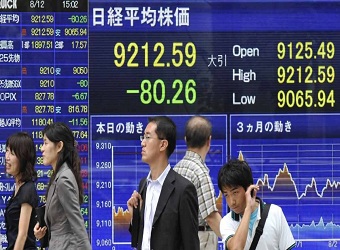Asian shares retraced earlier losses to trade higher on Thursday, as crude and gold prices also climbed.
Australia’s ASX 200 closed up 0.23 percent or 13.2 points at 5,664.6, supported by its energy sub-index, which was up 0.52 percent and its utilities sub-index, which gained 2.77 percent.
Rio Tinto shares fell 0.67 percent to A$65.25 each after it announced late Wednesday that it would pay a larger-than-expected dividend of $1.70 per share instead of the expected $1.33 per share and announced a $500 million share buyback.
The iron ore miner had beat on its 2016 profit expectations due to rising iron ore prices and cost-cutting measures.
But it shrugged off concerns that the sale of its Guinea’s Simandou project to Chinalco had stalled after an investigation into payments to a consultant who helped it win rights, Reuters reported.
Shares of BHP Billiton were off 1.24 percent to A$25.42, after it halted operations at its Escondida cooper mine in Chile, the world’s largest, ahead of a planned strike on Thursday, Reuters reported.
Chinese markets were higher as the Shanghai composite advanced 0.48 percent while the Shenzhen composite climbed 0.74 percent.
Hong Kong’s Hang Seng index gained 0.36 percent, while in South Korea, the Kospi was down 0.3 percent.
Softbank was up 0.91 percent, down from gains of more than 2 percent earlier, after it reported its third-quarter operating profit jumped 71 percent to 292 billion yen, supported by widespread profit strength.
Hitachi plunged 8.11 percent after news that Mitsubishi Heavy Industries, which was down 3.28 percent, requested for $6.64 billion to cover costs from their joint South African power plant project.
Japan’s core machinery orders added 6.7 percent, instead of the 3.1 percent rise forecast by a Reuters poll, in December from last month. The highly volatile data series is regarded as an indicator of capital spending in the coming months.
In central bank news, the Reserve Bank of New Zealand held its official cash rate unchanged at 1.75 percent and adopted a bias for holding rates steady through 2019.
The Reserve Bank of India also unexpectedly held its repo rate steady at 6.25 percent on Wednesday, and signaled the end of its easing cycle, likely due to its inflation targets.
“The RBI is set to dramatically undershoot its immediate objective of 5 percent inflation this quarter, which had fueled expectations for a rate cut today or else in April,” said a team of economists at JPMorgan, in a Thursday note.
Major U.S. indexes closed mixed with the Dow Jones industrial average down 0.18 percent at 20,054.34, the S&P 500 gained 0.07 percent, at 2,294.67 and the Nasdaq composite ended 0.15 percent higher at 5,682.45.
On the currency front, the dollar index, which tracks the greenback against a basket of currencies, was stronger at 100.31, up from levels below 100 earlier this week.
But the yen weakened slightly against the dollar, tracking 112.21, but it was still down from levels of 113 last week.
During Asian trade, spot gold prices traded at $1,239.74 an ounce, on political risk sentiment.
“Geopolitical risks continue to underpin gold in the face of the prospect of higher U.S. interest rates this year,” explained Jeffrey Halley, senior market analyst at OANDA, in a note on Thursday.
Oil prices rose on the back of an unexpected draw in U.S. gasoline inventories.
Brent crude traded up 0.56 percent to $55.43 during Asian hours, while U.S. crude gained 0.52 percent to $52.61.
Source: CNBC


